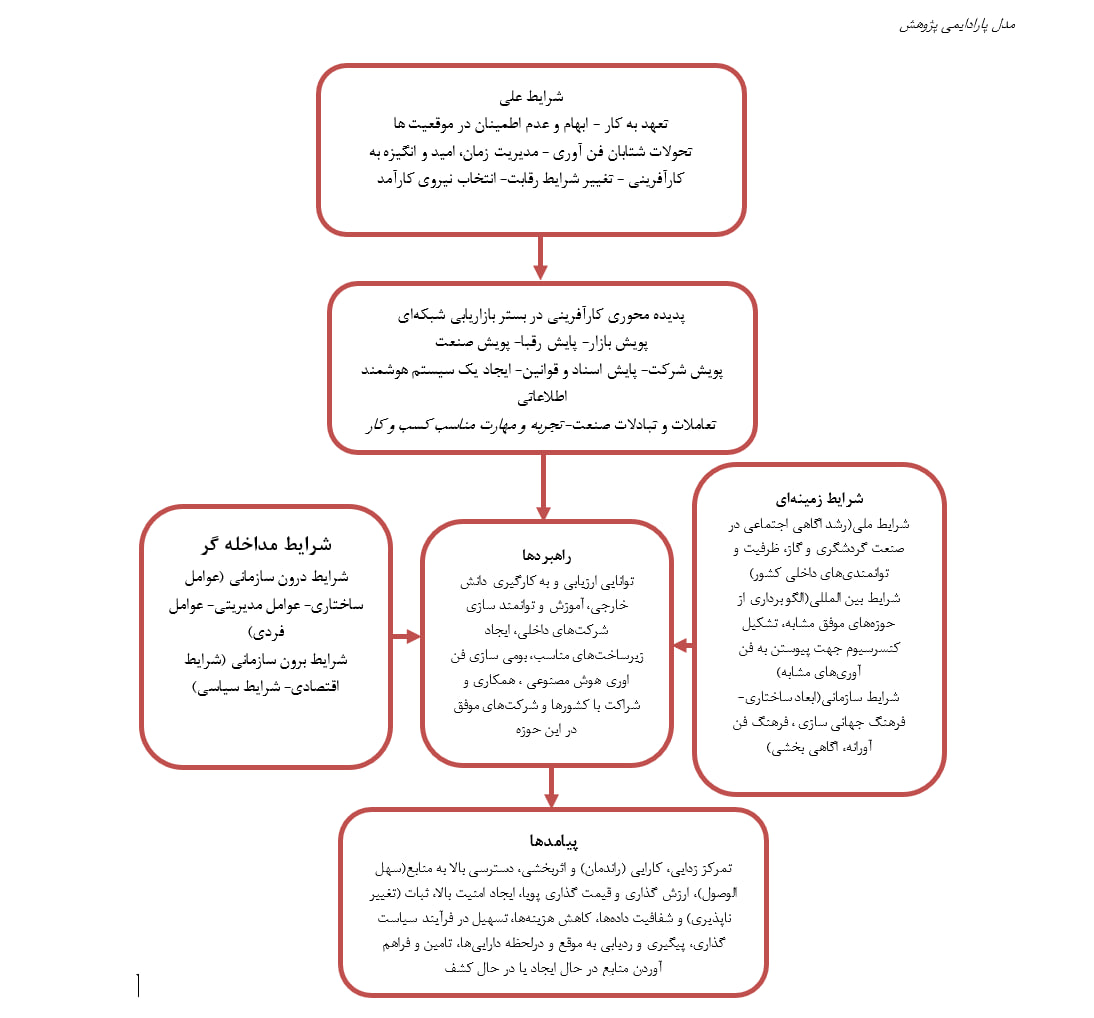Examining the Opportunities and Challenges of Entrepreneurship in Network Marketing Based on Grounded Theory
Keywords:
Opportunities, challenges, entrepreneurship, network marketing, grounded theoryAbstract
Network marketing, as an innovative business model, has created a unique opportunity for entrepreneurs to grow and develop their businesses through the establishment and management of distribution networks. This paper examines the opportunities and challenges of entrepreneurship in the context of network marketing using grounded theory. The aim of this paper is to identify the key factors in entrepreneurship opportunities and challenges and to propose a model for improving entrepreneurs' performance. This research is applied in nature and employs a mixed-data approach. A qualitative grounded theory method was used, while a descriptive-analytical approach was applied in the quantitative section. The findings indicate that network marketing entrepreneurship offers significant opportunities for entering the market and addressing unmet needs; however, it faces challenges related to adapting to rapid market changes and ensuring job security. Success depends on the strategic management of resources, market analysis, and the ability to identify and exploit emerging favorable conditions. The results of this study can assist entrepreneurs and policymakers in designing effective strategies to better leverage available opportunities and overcome challenges.
Downloads
References
Chiteli, N. (2013). Agent banking operations as a competitive strategy of commercial banks in Kisumu City. International Journal of Business and Social Science, 4(13).
Esser, J. (2022). Questions to Help Leaders Achieve Growth Amid Uncertainty. Harv. Bus. Rev.
Gartner, W. B. (2001). Is there an elephant in entrepreneurship? Blind assumptions in theory development. Entrepreneurship Theory and Practice, 25(4), 27-39. https://doi.org/https://doi.org/https://doi.org/10.1177/104225870102500403
Ghasemi Nejad, S. (2022). Examining the impact of attitudes toward entrepreneurship and organizational learning on customer satisfaction, with the mediating role of marketing capacity in supply chain management at Himalaya Company 1st International Conference on Applied Research in Humanities, Economics, Management, and Accounting, https://civilica.com/doc/1590671
Guerola-Navarro, V., Gil-Gomez, H., Oltra-Badenes, R., & Soto-Acosta, P. (2024). Customer relationship management and its impact on entrepreneurial marketing: A literature review. International Entrepreneurship and Management Journal, 20(2), 507-547. https://doi.org/https://doi.org/https://doi.org/10.1007/s11365-022-00800-x
Hiranpong, R., Decharin, P., & Thawesaengskulthai, N. (2016). Structural equation modeling of a potentially successful person in network marketing. Kasetsart Journal of Social Sciences, 37(1), 22-29. https://doi.org/https://doi.org/https://doi.org/10.1016/j.kjss.2016.01.009
Hsiao, S.-H., Wang, Y.-Y., Wang, T., & Kao, T.-W. (2020). How social media shapes the fashion industry: The spillover effects between private labels and national brands. Industrial Marketing Management, 86, 40-51. https://doi.org/https://doi.org/https://doi.org/10.1016/j.kjss.2016.01.009
Lu, Y., Dong, Y., Guo, H., & Xu, H. (2024). How Education Shapes Ethics in Network Marketing: The Role of Identity and Training. Sage Open, 14(2), 21582440241258061. https://doi.org/https://doi.org/https://doi.org/10.1177/21582440241258061
Moghadam, M., Memar, A., Arani, A. Z., & Meisami, M. (2010). Network marketing and the activities of pyramid companies from a jurisprudential-economic perspective. Islamic Economics Studies, 3(2), 31-58. https://doi.org/https://sid.ir/paper/462967/fa
Monferrer, D., Moliner, M. Á., Irún, B., & Estrada, M. (2021). Network market and entrepreneurial orientations as facilitators of international performance in born globals. The mediating role of ambidextrous dynamic capabilities. Journal of Business Research, 137, 430-443. https://doi.org/https://doi.org/https://doi.org/10.1016/j.jbusres.2021.08.058
Norouzi Seyed hossini, R., Roumiani, m., & Roumiani, S. (2024). The Framework for the Development of new Entrepreneurship in Sports: From Idea to Action. Journal of Entrepreneurship Development, 17(1), 80-119. https://doi.org/10.22059/jed.2024.365400.654266
Ogutu, M., & Samuel, C. M. (2012). Strategies adopted by multinational corporations to cope with competition in Kenya. http://erepository.uonbi.ac.ke:8080/xmlui/handle/123456789/9761
Radhakrishnan, R., & Aithal, P. (2024). Review Based Research Topic Identification and Analysis on Multi-Level Marketing Business. International Journal of Applied Engineering and Management Letters (IJAEML), 8(2), 74-112. https://doi.org/https://doi.org/https://doi.org/10.47992/IJAEML.2581.7000.0224
Ravasan, A. Z., & Mansouri, T. (2018). A fuzzy ANP based weighted RFM model for customer segmentation in auto insurance sector. In Intelligent Systems: Concepts, Methodologies, Tools, and Applications (pp. 1050-1067). IGI Global. https://doi.org/https://doi.org/10.4018/978-1-5225-5643-5.ch044
Shafiei, S., Louloui, K., & Tehrayian, T. (2016). A study on network marketing in Iran 7th International Conference on Economics and Management, https://civilica.com/doc/536049
So, K. K. F., King, C., Sparks, B. A., & Wang, Y. (2016). Enhancing customer relationships with retail service brands: The role of customer engagement. Journal of Service Management, 27(2), 170-193. https://doi.org/https://doi.org/10.1108/JOSM-05-2015-0176
Soltani, Z., & Navimipour, N. J. (2016). Customer relationship management mechanisms: A systematic review of the state of the art literature and recommendations for future research. Computers in human Behavior, 61, 667-688. https://doi.org/https://doi.org/https://doi.org/10.1016/j.chb.2016.03.008
Tiwari, P. (2023). Effect of innovation practices of banks on customer loyalty: an SEM-ANN approach. Benchmarking: An International Journal, 30(10), 4536-4568. https://doi.org/https://doi.org/https://doi.org/10.1108/BIJ-06-2022-0392
Vicedo, P., Gil-Gomez, H., Oltra-Badenes, R., & Guerola-Navarro, V. (2020). A bibliometric overview of how critical success factors influence on enterprise resource planning implementations. Journal of Intelligent & Fuzzy Systems, 38(5), 5475-5487. https://doi.org/https://doi.org/10.3233/JIFS-179639
Wali, A. F., Uduma, I. A., & Wright, L. T. (2016). Customer relationship management (CRM) experiences of Business-to-Business (B2B) marketing firms: A qualitative study. Cogent Business & Management, 3(1), 1183555. https://doi.org/https://doi.org/https://doi.org/10.1080/23311975.2016.1183555
Wirtz, J., & Chew, P. (2023). Customer Loyalty for Services1. Elgar Encyclopedia of Services, 28(2), 281.
Wood, M. S. (2021). Entrepreneurial opportunity: Bedrock in entrepreneurship research. In Oxford Research Encyclopedia of Business and Management.
Zokaei, M. S., & Esmaeili, M. J. (2009). Pathology of network marketing in Iran. https://doi.org/https://sid.ir/paper/462967/fa











